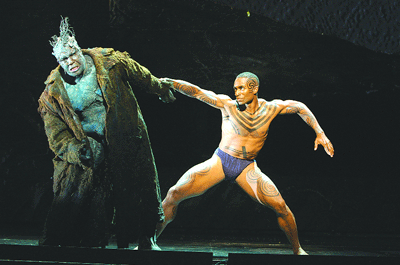Julie Taymor surmounts The Wall with “Grendel”
In the end, The Wall wasn’t the temperamental diva it had been made out to be.
Before the new opera “Grendel: Transcendence of the Great Big Bad” arrived at the New York State Theater this month, the media was abuzz with speculation on whether The Wall, a gigantic set piece, would work. It had malfunctioned on a spectacular scale late in rehearsals and forced the postponement of the opening night of the opera in its initial run in Los Angeles last month.
But in the performance heard July 13 at the Lincoln Center Festival, The Wall eschewed such unprofessional behavior and took its rightful place in the background of the action.
First, though, director Julie Taymor gave The Wall a star entrance, a slow twirl all alone onstage. This visual moment faced little competition from composer Eliot Goldenthal’s nondescript music for this scene, which began as a few atonal scratches and built into a massive, well, wall of sound. As the tumult subsided, Eric Owens (Grendel) stepped forward to speak (not sing) his first lines.
The intention seems to be to focus close attention on the libretto by Taymor and J. D. McClatchy, but the effect is that the opera stops before it even gets started. Eventually, though, Grendel does sing, first solo and then with the assistance of a trio of doppelgangers (triplegangers?), who sometimes do backup and other times allow Owens a breather from his marathon vocal role.
Goldenthal hits his stride in the next scene, in which we first see the human society Grendel comes to detest. The ceremonial music for a hero’s funeral is unambiguously tonal, based on Philip Glass-style arpeggios and droning chords. Even when the percussion ramps up for battle scenes, Goldenthal’s “human” music invokes a timeless and unchanging world. The melancholy modal songs of the blind Shaper take on a particularly pungent tinge of nostalgia in the sweet mezza voce of tenor Richard Croft.
The second act is dominated by two sumptuous scenes for Queen Wealtheow, pure lyricism for the shimmering soprano voice of Laura Claycomb. In a long scene for Denyce Graves as a diva dragon (think Norma Desmond as Fafner), Taymor strove too hard for camp, or maybe Graves just didn’t have the style to pull it off. The scene lacked both dramatic point and sufficient sense of fun to justify inclusion in an already long evening’s entertainment.
So everyone in the opera gets something grateful to sing—all except Grendel himself, who huffs and puffs and bellows literally for hours without payoff either vocally or dramatically. His music constantly seems headed toward a big moment without ever getting there. Here, perhaps, is the insoluble problem in dramatizing “Grendel”—the themes of the source material are passivity and nihilism. Goldenthal never manages the perhaps impossible task of making musical sense of Grendel’s joy in the leaving of life.
Dramatically, too, the opera tends to static tableaux and extended ballet sequences—the climactic battle, for example, is staged as a long dance solo for Beowulf (Desmond Richardson). For an opera with the word “transcendence” in the title, “Grendel” never manages to soar musically.
The whole of “Grendel,” though, does seem a good deal more than the sum of its parts. Taymor’s elegantly poetic staging always holds the eye, particularly in a dream sequence in the second act in which Grendel and Wealtheow drift along in a magical boat. The theater was packed for this performance, and, unique in my experience at contemporary opera, practically nobody left after the first half.
James Jorden is the producer of the podcast “Unnatural Acts of Opera” (parterre.com/unnaturalacts.htm).
gaycitynews.com


































